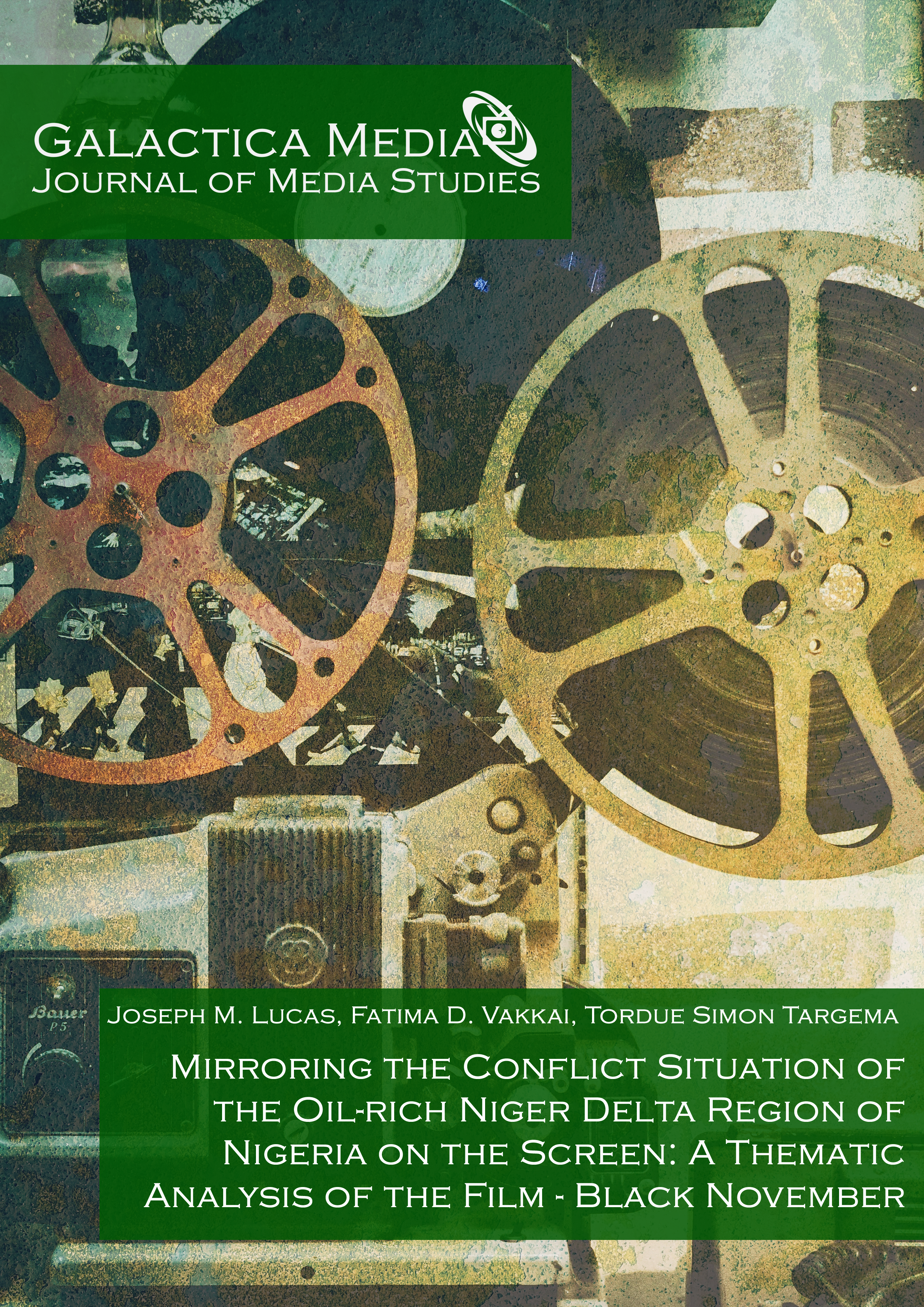Abstract
This study examines the potentials of film in managing conflict in the oil rich Niger Delta region of Nigeria. This is against the backdrop that since the commencement of oil production in the region in the 1960s to date, it has continued to experience one form of armed conflict or the other. These manifest in several ways such as kidnapping of foreign oil workers, vandalization of oil facilities and confrontation with security operatives by militants, leaving adverse effects on the Nigerian economy which depends on crude oil as the major source of income. The paradox of plenty or resource curse that has come to characterize the region and how it can be addressed, therefore, is what prompts the current study. Using the Nollywood film- Black November, the study demonstrates that film is an instrument that can be used effectively to manage conflicts in the region. From the viewpoint of Singhal and Rogers’ Entertainment-Education approach, the study adopts thematic analysis to identify and discuss the various themes embedded in the film. Findings indicate that several forces are behind the intractable conflict in the region as contained in the film, such as exploitation of resident communities by multinational oil companies, environmental degradation occasioned by oil spillage and gas flaring, and gross injustice, insincerity and human rights abuse by security operatives that make the people lose faith and confidence in both them and the government which they represent. Other causes include betrayal and corruption on the part of community leaders and the burning fire of patriotism in the youth who are determined to fight for their rights. Given the rich thematic embodiment of the film, the study concludes that film has potentials which, if effectively harnessed, will go a long way in managing conflicts in the society.
References
Abdussalam, I. K. (2014). Minority question and persistent instability in Nigeria: a product of imperfect colonial legacy, selfish politics and the poverty of history. In V. Egwemi, T. Wuam & C.S. Orngu (Eds). Federalism, Politics and Minorities in Nigeria: Essays in Honour of Professor G.N. Hembe, (pp. 55-64). Lagos: Bahiti and Dalila Publishers.
Afinotan, L. A. & Ojakorotu, V. (2009). The Niger Delta crisis: Issues, challenges and prospects. African Journal of Political Science and International Relations, 3(5), 191-198.
Anstey, M. (2008). Managing conflict: negotiating change. Cape Town: Juta.
Apuke, O. D. (2017). Exploring the issues in oil production in the Niger Delta region of Nigeria security challenges and suggested solutions. Arabian Journal of Business and Management Review (Oman Chapter), 6 (11), 59-83. Doi: 10.12816/0039077
Chile, D. & Targema, T. S. (2017). Film and good governance in Nigeria: an analysis of Praise Abraham’s Tartor Wase. Paper presented at the 4th annual conference of the Association of Communication Scholars and Professionals of Nigeria, Green Desert Hotel, Kano, Nigeria, September, pp. 6-7.
Egbefo, D. O., Mohammed, A. B., Apara, S. A & Ngarka, T. S. (2010). Peace studies and conflict resolution for Nigerian undergraduates. Jos: Star-Link Books.
Gallo, G. (2012). Conflict theory, complexity and systems approach. Systems Research and Behavioural Science, 30(5), 156-175. doi: 10.1002/sres.2132
Galtung, J. (1971). A structural theory of imperialism. Journal of Peace Research, 8(2), 81-117.
Jacobs, C. P. (n.d.). Film theory and approaches to criticism, or, what did a movie mean? Retrieved from https://www.academia.edu/27698476/Film_Theory_and_Approaches_to_Criticism_or_What_did_that_movie_mean
Jeong, H. (2010). Conflict management and resolution: an introduction. New York: Routledge.
Katu-Ogundimu, N. N. (2013). Film review: an analysis of Funke Akindele’s film Jenifa. Journal of communication and media research, 5(2). 159-170.
Kurfi, M. Y. (2017). Film and conflict resolution in multi-cultural Nigeria. In U. Pate & L. Oso (Eds.), Multiculturalism, Diversity and Reporting Conflict in Nigeria. (pp. 334-347). Ibadan: Evans Brothers (Nigeria Publishers) Limited.
Littlejohn, S. W. & Foss, K. A. (2009). Encyclopaedia of communication theory. SAGE: New Delhi.
McPhail, T. L. (2009). Major theories following modernization. In T.L. McPhail (Ed.), Development Communication: Reframing the Role of the Media (pp. 21-48). West Sussex: Blackwell Publishing Ltd.
Niger Delta States. Retrieved from https://en.m.wikipedia.org/wiki/Niger-Delta. Acessed, 4-12-2017
Nwabueze, C. (2014). Introduction to Mass Communication: Media Ecology in the Global Village. Owerri: Top Shelve Publishers.
Nwankwo, B. O. (2015). The politics of conflict over oil in the Niger Delta region of Nigeria: a review of the corporate social responsibility strategies of the oil companies. American Journal of Educational Research, 3(4), 383-392. Doi: 10.12691/education-3-4-1.
Nykon, B. P. (2011). The feature film as a vehicle for disseminating principles of conflict resolution. Journal of Conflictology, 2(2), 18-30.
Oruonye, E.D. (2012). The socio-economic impact of land resource conflict in Taraba State: A case study of Kona – Minda crisis in Northern Taraba. International Journal of Environmental Sciences, 1(2), 46-49.
Owens-Ibie, N. & Ademosu, I. (2017). Side by side: engaging Nigerian ethnic peculiarities in ‘Phone Swap’. In U. Pate & L. Oso (Eds.), Multiculturalism, Diversity and Reporting Conflict in Nigeria. (pp. 334-347). Ibadan: Evans Brothers (Nigeria Publishers) Limited.
Singhal, A. & Rogers, E. (1999). Entertainment education: a communication strategy for social change. Mahwah, NJ: Lawrence Erlbaum Associates.
Stiglitz, J. E. (2006). Making globalization work. New York: W. W. Norton & Company, Inc.
Suntai, D. I. & Targema, T. S. (2017). Madagascar Escape 2 Africa and parents’ career expectations for children: a thematic discourse. The Journal of African Theatre, Film and Media Discourse, 1(1), 78-88. Doi: 10.33886/kujat.v1i1.127
Tufte, T. (2002). Edutainment in HIV/AIDS prevention. building on the Soul City experience in South Africa. In J. Servaes, (Ed.), Approaches to Development Communication. Paris: UNESCO.
Yuguda, M. A & Goni, I. (2013). Ethno-religious conflict in Taraba State and its implications on socioeconomic, political and educational development of youths. International Journal of Social Sciences and Humanities Reviews, 4(3), 149-155.

This work is licensed under a Creative Commons Attribution 4.0 International License.

